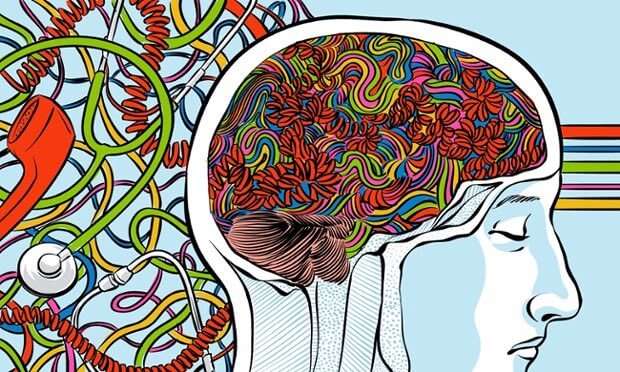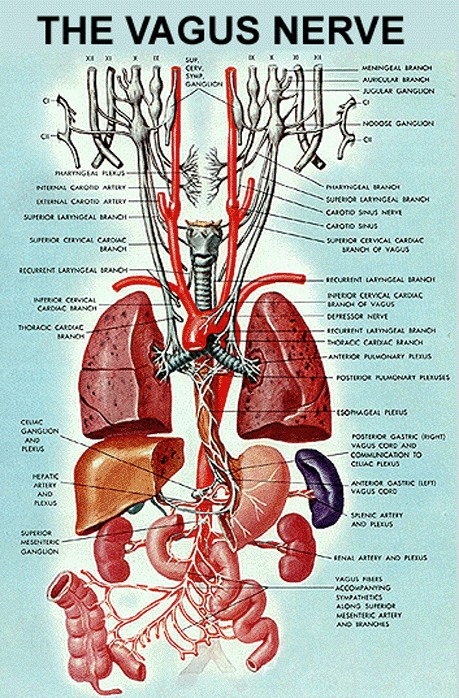The Vagus Nerve Can Take Away Anxiety


Written and verified by the psychologist Valeria Sabater
The vagus nerve interacts with so many different parts of our body. So much so that many define it as our body’s driving force, an internal channel that regulates rest and also deactivates any signs of anxiety in our body. Knowing how to stimulate it through exercises such as diaphragmatic breathing would undoubtedly help us reduce many of those negative emotions that grind us down on a daily basis.
Think for a moment about all those situations that generate anxiety, of everything that produces fear, discomfort, aversion … If we examine these moments we will see how, at a given moment, our stomach or intestines begin to suffer spasms, cramps and it feels as if there are a hundred angry butterflies flapping around inside us. This sensation is instantly picked up by the vagus nerve and it sends a clear message to the brain: “we have a threat”.
“Where the water is at its deepest, it is at its calmest”
-WIlliam Shakespeare-
Professor Wolfgang Langhans of ETH Zurich and his team discovered a few years ago that this fascinating nerve is closely related to our emotions, and, more specifically, to the feeling of fear or the desire to escape. They showed, for example, that people suffering from chronic anxiety suffer a hypersensitivity in this nerve. In addition, and this is important to remember, the vagus nerve starts from the cerebellum and supplies the digestive, intestinal, respiratory systems, as well as the heart and liver.
Thus, much of our body loses its equilibrium when it falls victim to anxiety: the heart accelerates, digestion becomes heavy and we suffer diarrhea. Now, one way to regulate the impact of many of our negative emotions, is to “activate” the vagus nerve properly. Even though the nerve responds automatically to different situations in our body, it is possible to stimulate or boost it to promote a feeling of relaxation.

The vagus nerve: a part of our body we should all know about
In 1921, a Nobel Prize-winning German physiologist, Otto Loewi, discovered that stimulating the vagus nerve had a very interesting effect: the heart rate was reduced and a very special substance was released into the body. He called this substance “Vagusstoff“(which translated from the German is “vagus substance”). This “vagus substance” was actually a very specific neurotransmitter: acetylcholine, and it was the first neurotransmitter identified by scientists.
Acetylcholine is one of the most important chemicals in our body because it enables nerve impulses to be transmitted. The vagus nerve, on the other hand, fulfills an equally essential role: it acts as a driving force of the parasympathetic nervous system, taking charge of regulating our reactions regarding rest, digestion, the need to escape or relaxation.
It is, in a manner of speaking, a power game, where well-being is in the centre of the homeostatic balance.
It is like the “yin-yang” of our organism, where the optimal point is to be able to enjoy a proper level of activation, in which we won’t experience any sensation of alarm, but neither will we become overly relaxed, vulnerable or apathetic.

Clinical psychologists like Kyle Bourassa of the University of Arizona explain that something as basic as favoring a healthy connection of the vagus nerve between the intestines and the brain would help us greatly. For example, it would help our body to better regulate the production of neurotransmitters such as acetylcholine and GABA (gamma-aminobutyric acid). In this way, and thanks to these neurotransmitters, we’ll be able to reduce our heart rate, blood pressure and slow down the activity of overactivated organs due to the effects of anxiety. Two of the benefits of this will be better sleep and better digestion.
Now we’ll take a deeper look at how to put this into practice.
How to stimulate the vagus nerve?
There are some people who can stimulate the vagus nerve thanks to a good physiotherapist specialized in this area. Through a series of massages in the area of the mouth of the stomach, the vagus nerve can be activated to produce a pleasant sensation of calm and thus alleviate the intestinal spasms associated with anxiety.
“A calm mind brings inner strength and confidence in oneself, that’s why it’s so important for our health”
-Dalai Lama-
However, there is another method which we can carry out on our own. We achieve this through diaphragmatic breathing. It’s a good strategy for relaxation, and if you practice it daily, you will also perceive fewer sensations of threat, a better digestion, a better internal balance and a more refreshing rest. There are also many other strategies that, combined with deep or diaphragmatic breathing, can help us greatly:
- Moderate aerobic exercise on a daily basis
- Positive and enriching social connections
- Practicing meditation
- Keeping a diary to get to know ourselves better
- Consumption of probiotics – having strong, healthy intestinal flora results in better brain health
- Cold showers for a few seconds
- Practicing yoga
- Sleeping on our left side
- Laughing frequently
- Increasing our levels of serotonin and oxytocin

In conclusion, as we can see in the list above, there is one aspect that should definitely capture our attention. The simple fact of producing positive emotions, having a good social life, moments of leisure, laughter and relaxation… these all stimulate our vagus nerve and are of great benefit for our bodies. We shouldn’t forget that it is in the intestine itself where between 80 and 90% of our serotonin is manufactured. Serotonin is commonly known as the “well-being hormone”. Nor can we overlook that simply having a smile on our face, dancing, walking, swimming…all of these generate very positive metabolic changes. Changes that the amazing vagus nerve, which connects to so many parts of our body, receives instantly, and sends a very specific message to our brain: “Everything’s going well, all is calm!”.
This text is provided for informational purposes only and does not replace consultation with a professional. If in doubt, consult your specialist.








